Watch CNN Special Report “Return to Mosul” with international correspondent Arwa Damon on Saturday at 9 p.m. ET.
The last time I saw Mattar, she was running for her life, and she was angry.
Angry at the ISIS fighters shooting outside, angry at the soldiers hiding in her home, angry at her family’s misfortune, to live in Iraq at a time like this.
And angry with me, for repeatedly telling her that back up units were on their way, though none had arrived.
Photojournalist Brice Lainé and I had embedded with a unit of Iraqi counter-terrorism troops as they pushed to take streets from ISIS in eastern Mosul. But things had gone badly wrong. Trapped in its maze of narrow, muddy side roads, our convoy was pinned down, our escape route blocked.
After our armored vehicle took a direct hit we dashed from house to house to get away from the encroaching ISIS fighters, eventually ending up in Mattar’s home. There, the family, soldiers and journalists spent one of the most terrifying nights of our lives as explosions rocked the building and a deadly firefight raged outside.
Yet the family had fed us and the soldiers, made us tea, offered us blankets, and all the while Mattar had kept her sense of humor and her dignity.
Return to Mosul: Hell and humanity in ISIS’ shadow
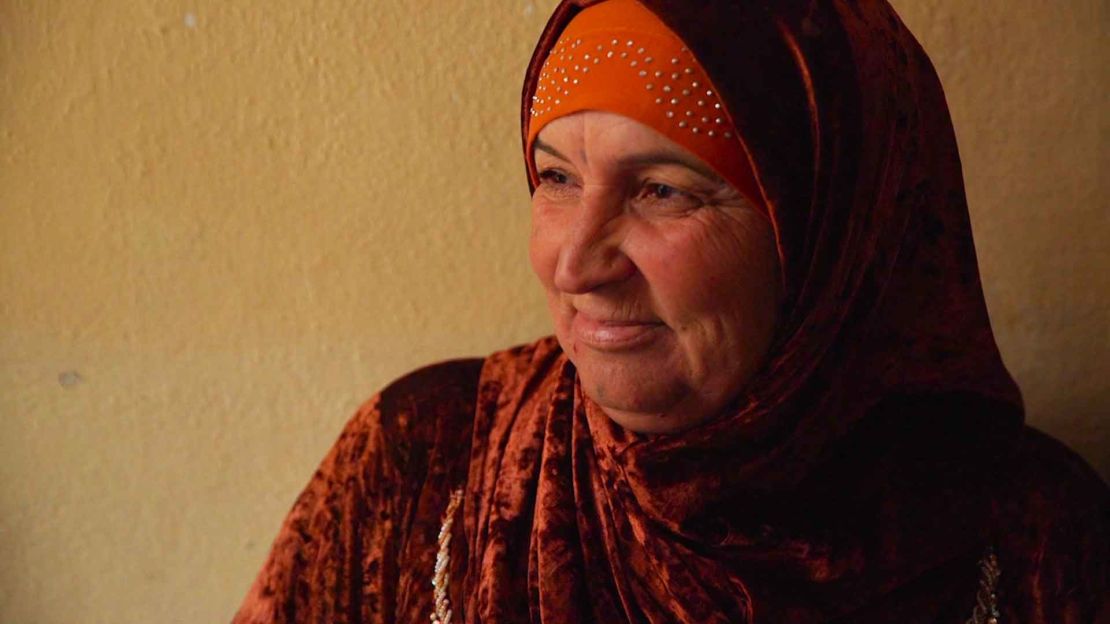
Just seven years my senior, Mattar had become my “Mosul mom” in those hours, though she’d joked how unfair it was that I looked so much younger, and had not gone gray.
“Look! This is what being Iraqi does to you,” she said, showing me the roots of her hair.
Then, at dawn, when the firefight erupted again, worse than ever, and an airstrike on the house next door had her family screaming in fear under the stairs, they had fled in panic, barefoot and without looking back, amid a hail of bullets and grenades.
I had not even had a chance to hug her goodbye, to say thank you.
We eventually escaped, went home, enjoyed the luxury of feeling safe, but what had happened to them?
For two months, Brice and I had worried about the soldiers who were with us that day, about the civilians who sheltered us, about Mattar and her family.
We had to go back and find out.
28 hours in Mosul: Leading the attack, then trapped
Searching for old friends
We are disoriented at first, we can’t get our bearings. Our memories are of vehicles exploding in a ball of flames, of the burned-out wrecks of others, of mad dashes to safety. Is this the place?
We think we recognize the street, and then the street recognizes us: A man in whose brother’s house we briefly sought refuge in comes over to say hello.
The man, Nawfal, had been so kind, frying eggs for us and the troops as his terrified wife Farah and frightened children cowered in a void behind a flimsy wooden cupboard.
Farah’s hands are shaking again as she grabs mine in greeting. The trauma of this city is beyond comprehension.
Walking onward, up the road towards Mattar’s place, we are anxious, uneasy, hoping they are there, but afraid of what we might find out.
I can’t remember what the house looked like from the outside, can’t work out which one it is, until I spot a familiar – but changed – face: it’s Mattar’s husband, Abu Abdullah, without his big gray beard.
As we gossiped together to pass the time that night months ago, Mattar had giggled that she thought her husband was better looking clean shaven, and how much she was looking forward to the day ISIS was gone, so he could cut off his beard.
“You promised you would come back,” he says. “You are a good girl.”
Rescuing Arwa and Brice: My toughest 24 hours
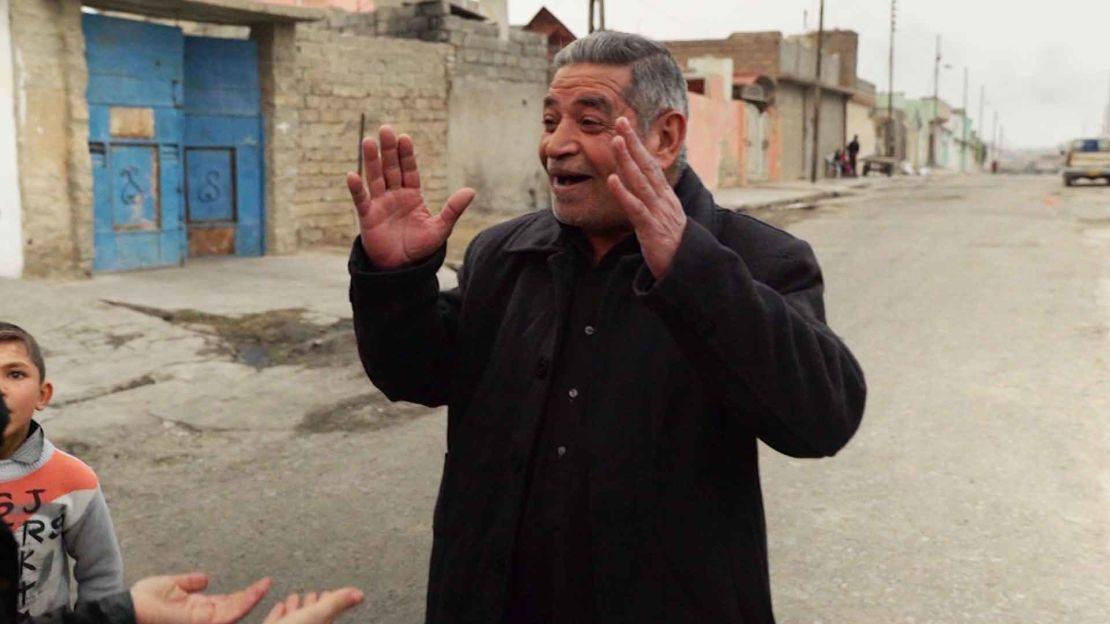
I take a deep breath and ask the question we’ve been dreading hearing the answer to: “Is everyone all right? We heard someone had died.” “No,” he assures us, grinning, “Everyone is OK.”
Then all of a sudden, Mattar is there. She barrels into me, crushing my ribs with a hearty “big momma” hug and covering my face with kisses.
“Ayy! I ran to see you,” she says, pulling me to the ground and sobbing. “You came back!”
She’s tired, she says. It’s been a difficult few months, and they haven’t long been back. After they ran out of the house, she tells me, they were stopped by armed ISIS fighters and themselves had to seek shelter in another relative’s house.
Eventually they escaped and made it to Gogjali, a town on the outskirts of Mosul which had already been liberated. They stayed there a month. “We still didn’t have our shoes,” they say.
Now things are looking up; they are home and there’s a new baby in the family.
“You’re not mad?” I ask, worried. No, Mattar insists, she’s not angry, she doesn’t hate us. As if to prove it, she shares wonderful but very unexpected news.
“I named my granddaughter after you, because I love you.” I’m lost for words, enveloped in a bubble of happiness and relief.
The kindness of Iraqis, despite everything they have been through, always stuns me.
Return to Mosul: Hell and humanity in ISIS’ shadow
Orphaned by an airstrike
But if the story of Iraq is one of survival of the human spirit, it is also one of deep suffocating sorrow, and moments later, my joy evaporates as Mattar’s neighbour arrives.
“You filmed my son getting shot,” he says.
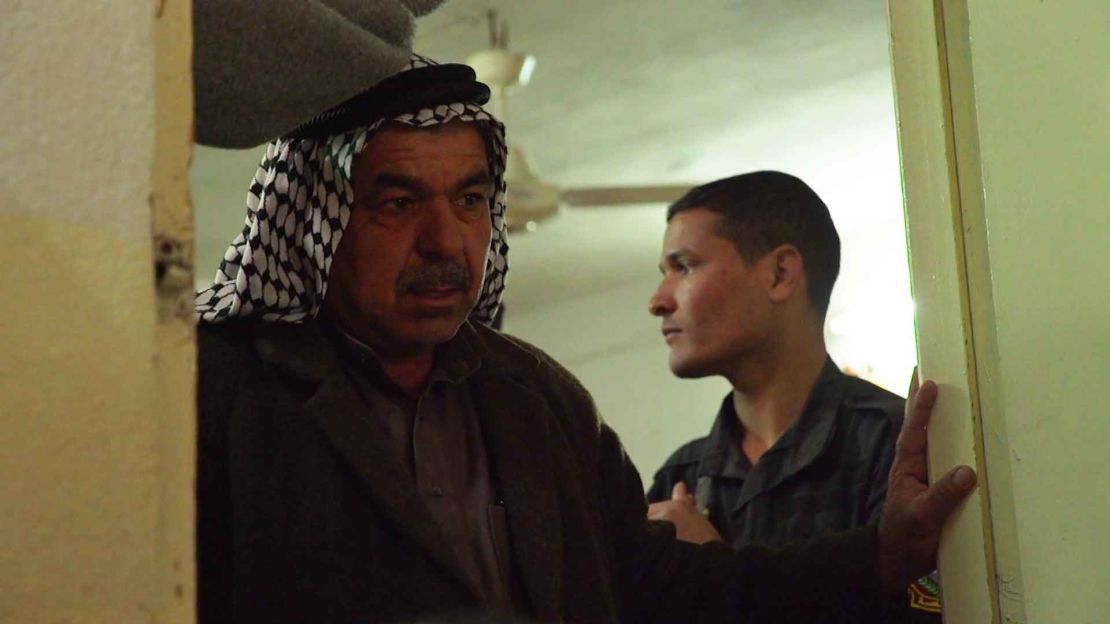
Abu Yassin’s son was mistaken for a fighter and killed as he stood on the roof of the family’s home. Brice captured the piercing wail of a woman ringing out as his son’s death was discovered.
And he was not the only civilian killed that day in this war that has no real front lines, no rules.
The airstrike that hit the house next door while we were here killed eight civilians, Abu Yassin says. Only three survived: two teenagers and a little boy, orphaned in the raid.
A relative who’s now caring for the little boy says he hasn’t been able to tell him that his parents and sisters are dead. His voice shakes with emotion as we talk on the phone. But he wants to make one thing clear – he forgives the person who hit the house, saving his anger for ISIS.
“I know that if the pilot, no matter where he is from or his religion, knew that there were two families in the house they would not have taken the strike, or they would have used a smaller rocket,” he says.
Eleven people were sheltering in the house – under the stairs, just like Mattar’s children next door – when a group of ISIS fighters jumped the wall, the man says. The militants climbed up to the roof, tossed a grenade into the yard, and were getting ready to attack the house where we were when the airstrike killed them – and their hostages, who were being held at gunpoint.
These two families lived just 20 feet apart; one survived, one was destroyed.
Iraqis know war. They know the pain of loss. They have lived it for decades. But there is precious little room for joy here, just all-too-fleeting moments of happiness.
Taking western Mosul from ISIS: 5 key questions
Family fled barefoot, in panic
Iraq is a nation known for its tribal ways, its brutality. But it is also a nation whose people are kind and caring – to friends, family, and even complete strangers.
Mattar’s living room that day became both sleeping quarters and makeshift clinic, as wounded soldiers were brought in, and the family shared their meager meals with all of us, keen to maintain the Iraqi hospitality that somehow endures through the worst situations.
She and I spent hours together, talking, laughing and telling stories, in between my trips to the roof to message Hamdi, our field producer and lifeline, who was desperately trying to get us out of there.
Mattar and her family had every right to resent us, for blundering into their home with a video camera and soldiers and filming them. But they have that kindness and purity that is intrinsic to Iraqis – though it’s a part that outsiders, too used to footage of war and destruction, never see.
There was humor too. As night fell, she had even joked, “come, I will cradle you to sleep,” before adding, eyes twinkling, “but I am too fat! I might roll on you and squish you!”
Then the following morning, after a fraught, restless night, Mattar’s jovial exterior finally cracked, exposing the cold, gut-wrenching terror beneath.
This woman, who just hours earlier had ducked her head, too shy to show the Iraqi soldiers her face, now ran out into the courtyard to shout at them, plead with them, to help her, to save her family.
They tried to reassure her, but it was no use; even though we could hear suicide car bombs and grenades going off outside, she became convinced the family had to try to escape.
“We aren’t going to survive,” she had wailed in panic. “We need to get out of here. Even if three or four of us die, the rest will survive.”
And then, suddenly, they were gone.
So this is what it looks like when someone “flees with just the clothes on their back,” I thought. I’ve used the phrase so many times on air. Now I truly understood it.
Return to Mosul: Hell and humanity in ISIS’ shadow
Looking to the future
But unlike so many of the stories to come out of Iraq in recent years, Mattar’s has a hopeful ending – for now at least, though the shadow of ISIS still hangs over their home
In western Mosul there’s a fierce battle being fought against ISIS, but here in the city’s east, life is coming back though risks remain: people are returning to their homes, shops and markets are reopening, and children are finally able to go back to school, to try and recover from the horrors they have witnessed.
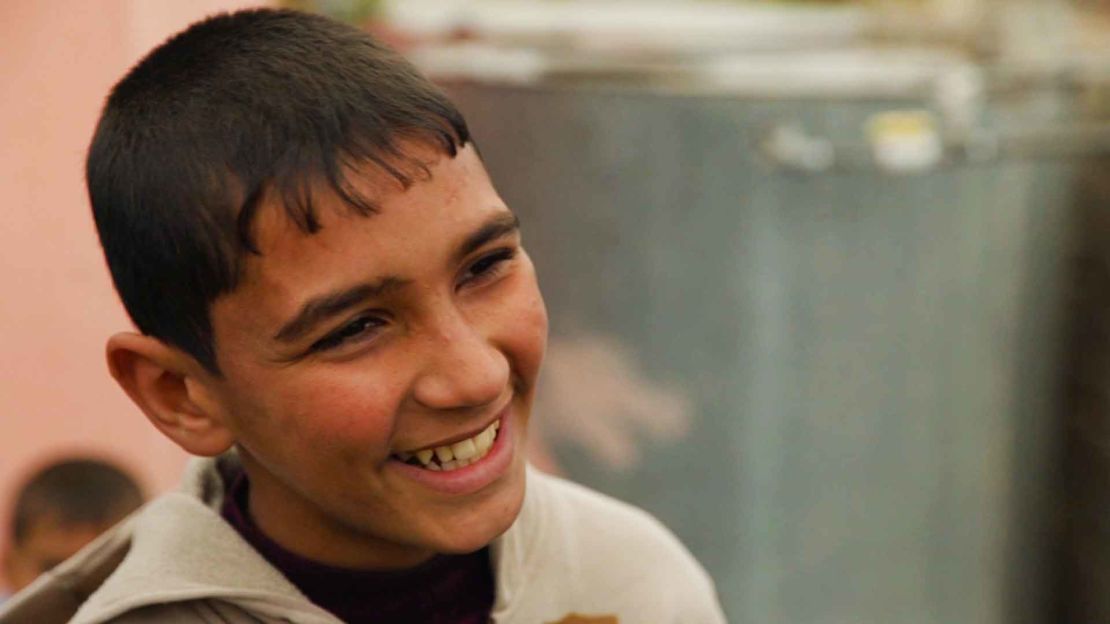
We last saw Mattar’s son Ahmed, 10, crouching beneath the stairs, screaming in fear as soldiers shot through the kitchen window at ISIS fighters outside. “I am still little,” he says, “I was scared; I didn’t want to die.”
Now he can look to future. “I want to be a doctor,” he tells us.
Arwa Damon: Why I’ll always go back to Iraq
Days after our first reunion, we’re back at Mattar’s house for one last visit before we leave Iraq, and – after making sure I’ve washed my hands, placing the soap between my palms and turning the faucet on for me, as though I were her child – she smiles.
“Come, come,” she says. “There’s someone I want you to meet.”
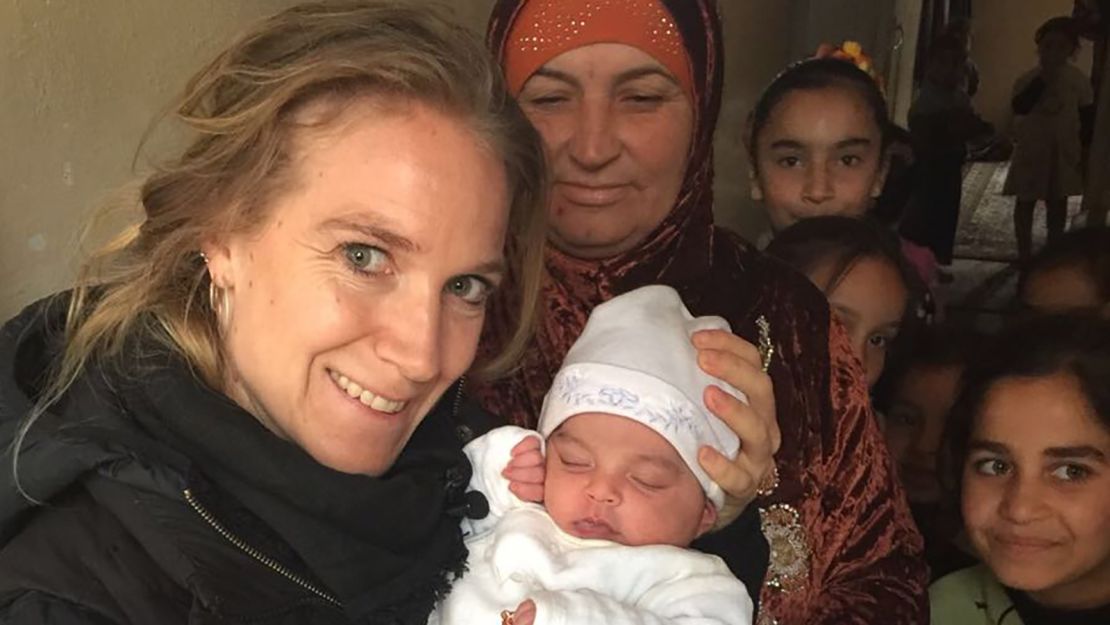
It’s my namesake, baby Arwa. I’m touched at the huge honor this beautiful family has bestowed on me. She is sleeping peacefully, oblivious to the danger all around her.
“Take her,” Mattar says, only half joking, as she gently lays the dozing newborn in my arms. “Take her to America.”
But little Arwa’s place is here, in Iraq, in Mosul. Perhaps by the time she’s old enough to remember, the war will be over.
This story was reported by Arwa Damon, Brice Lainé, Hamdi Alkhshali and Muwafak Mohammed in Mosul, Iraq. It was edited and produced by Bryony Jones in London. Tim Lister contributed to the story.








